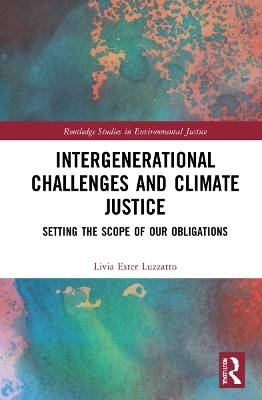
Intergenerational Challenges and Climate Justice
Setting the Scope of Our Obligations
Seiten
2024
Routledge (Verlag)
978-1-032-19379-3 (ISBN)
Routledge (Verlag)
978-1-032-19379-3 (ISBN)
Climate change poses questions of intergenerational justice, but some of its features make it difficult to determine whether we have obligations of climate justice to future generations. This book offers a novel argument, justifying the present generation’s obligation to future people.
Climate change poses questions of intergenerational justice, but some of its features make it difficult to determine whether we have obligations of climate justice to future generations. This book offers a novel argument, justifying the present generation’s obligations to future people.
Livia Ester Luzzatto shows that we have intergenerational obligations because many of our actions are based on presuppositions about future people. When agents engage in such intergenerational actions, they also acquire an obligation to recognise those future people as agents within their principles of justice and with that a duty to respect their agency and autonomy. Intergenerational Challenges and Climate Justice also offers a way to circumvent the problems of non-identity and non-existence. Its approach overcomes the intergenerational challenges of climate change by meeting three necessary criteria: providing ways to cope with uncertainty, dealing with the complexity of climate change, and including future people for their own sake. The author meets these criteria by adopting an action-centred methodology that grounds our obligations of justice on the presuppositions of activity. This robust framework can be used to justify increased climate action and the greater inclusion of future-oriented policies in current decision-making.
This book will be of great interest to academics and students concerned with the issues of climate and intergenerational justice.
Climate change poses questions of intergenerational justice, but some of its features make it difficult to determine whether we have obligations of climate justice to future generations. This book offers a novel argument, justifying the present generation’s obligations to future people.
Livia Ester Luzzatto shows that we have intergenerational obligations because many of our actions are based on presuppositions about future people. When agents engage in such intergenerational actions, they also acquire an obligation to recognise those future people as agents within their principles of justice and with that a duty to respect their agency and autonomy. Intergenerational Challenges and Climate Justice also offers a way to circumvent the problems of non-identity and non-existence. Its approach overcomes the intergenerational challenges of climate change by meeting three necessary criteria: providing ways to cope with uncertainty, dealing with the complexity of climate change, and including future people for their own sake. The author meets these criteria by adopting an action-centred methodology that grounds our obligations of justice on the presuppositions of activity. This robust framework can be used to justify increased climate action and the greater inclusion of future-oriented policies in current decision-making.
This book will be of great interest to academics and students concerned with the issues of climate and intergenerational justice.
Livia Ester Luzzatto completed her PhD in politics from the University of Reading, UK. Her research focuses on the intersection between climate change, ethics, and business challenges.
1. Introduction 2. Dealing with uncertainty 3. Climate change as a complex problem of justice 4. Including future people for their own sake 5. An account of the scope of climate justice 6. Changing perspective
| Erscheinungsdatum | 19.04.2022 |
|---|---|
| Reihe/Serie | Routledge Studies in Environmental Justice |
| Verlagsort | London |
| Sprache | englisch |
| Maße | 156 x 234 mm |
| Gewicht | 453 g |
| Themenwelt | Geisteswissenschaften ► Philosophie ► Ethik |
| Naturwissenschaften ► Biologie ► Ökologie / Naturschutz | |
| Technik ► Umwelttechnik / Biotechnologie | |
| ISBN-10 | 1-032-19379-4 / 1032193794 |
| ISBN-13 | 978-1-032-19379-3 / 9781032193793 |
| Zustand | Neuware |
| Informationen gemäß Produktsicherheitsverordnung (GPSR) | |
| Haben Sie eine Frage zum Produkt? |
Mehr entdecken
aus dem Bereich
aus dem Bereich


